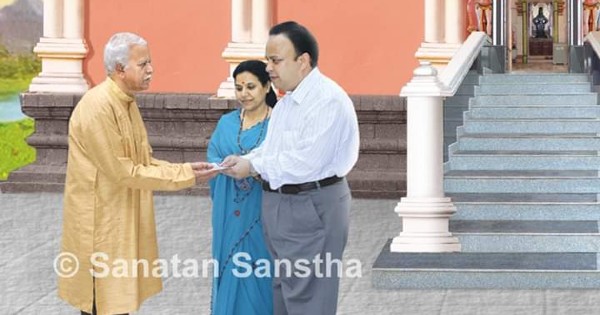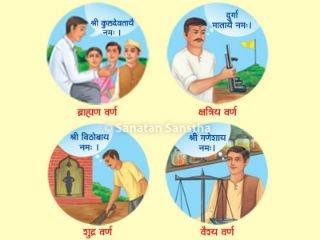
Meaning of daan (Offering) is as follows :
A. According to the Nyayakosh : Offering is a kind of sacrifice. Here, man surrenders the ownership of a particular object or money, and the recipient becomes the owner.
B. According to the Shabdakalpadrum : An offering is an object or money gifted with faith and respect to a deserving individual.
C. According to the Shandilyopanishad : An offering is an object or money procured by righteous means, gifted to a deserving individual with faith and respect.
Eknathī Bhagwat mentions, that ‘God first emancipates that wealthy individual who takes care of the spiritual and worldly needs of God’s weak devotee’.
Implied meaning : ‘Merits do not save and sins do not destroy, but it is bhav (Spiritual emotion) that protects. When fulfilling the worldly needs of a weak devotee, the bhav should be, ‘Who am I to take care of the needs of the devotee of God, when it is God Himself who takes care of my needs beyond my expectations ? In that case, will God Himself not take care of the needs of His devotee ? However, the interesting part is that God Himself is sustaining him by using me as an instrument. Moreover, like the proverbial ‘killing of two birds with one stone’, with the devotee’s emancipation He is also giving me an opportunity for self-emancipation’. – H.H. Kane Maharaj, Narayangaon, District Pune, Maharashtra
Dan is an excellent means of spending money, because it generates merits. If one rejects these merits, one’s spiritual level rises.
1. The six components of daan
The six components of daan are as mentioned ahead.
A. The donor
He should earn money righteously and offer it willingly as his duty. He should be of a sattvik temperament, should not expect anything from the daan and should do it in confidentiality to avoid the development of the ego.
B. The recipient
A Brahman of pure conduct and well-versed in the Vedas should be invited for a meal when performing religious rituals, and at the opportune moment and place when one comes across a deserving recipient, daan should be given. The Brahman who practises what the scriptures say and performs austerities is worthy of receiving dan. If a Brahman lacking in spiritual knowledge and penance is given a dan, it results in the spiritual deterioration of the donor as well as the recipient.
C. Faith
An offering should be made only if one has faith in the scriptures and respect for the recipient.
D. Dan
One who is wealthy or has the ability to amass wealth should earn money through righteous means and offer it for a spiritual cause. Offering money thus bestows the donor as well as the recipient with sattvik (Sattva-predominant) happiness. If money is earned through unrighteous means; for example, gambling, thefts etc.it is called as demoniacal wealth. Such wealth causes unhappiness to the donor as well as the recipient.
E. Place (where daan can be given)
Dan given in Varanasi, Kurukshetra, Brahmavarta, Prayag bestows more merits.
F. Time (Time period in which daan is given)
Dan given on Pratipada, at twilight, Sankrant or during eclipse bestows greater merits.
2. Offering should always be for Sat
The offering should always be for Sat (Absolute Truth), not to a beggar, hospital, school etc. which are related to asat (Great Illusion). It should always be to the ‘deserving’, that is, ‘to the one worthy of it’. In this world, there is none more worthy than the Saints; hence, any offering should be made only unto them. Saints and Gurus are the manifest (physical) forms of the unmanifest God. Hence, any offering made unto the Saints and the Guru is as good as an offering made to God Himself. Thus, offering back to God what belongs to Him does not create a ‘give and take account’, rather completes it. As such, the offering made unto Saints reduces the sanchit (Accumulated account) and increases the ability to endure the effects of prarabdha (Destiny). Moreover, neither is any ‘give and take account’ created, nor are any merits acquired. Hence, whatever has to be offered, it should be only to Saints or for the mission of the Absolute Truth. This is possible only for a seeker in the stage of Upasanakanḍa (Mental worship), who is chanting God’s Name. The one practising Karmayoga (Path of Action) at the inferior level gives alms to beggars, donations to schools and hospitals under the influence of emotions. Only merits are acquired from such actions. A mumukshu wants neither merits nor sins, since only heaven and not Moksha (Final Liberation) can be attained through merits.
3. What is sattvik daan?
A. Daan given without any expectation
B. Daan given willingly, with love and respect
C. Happiness of the recipient is the only intention in giving such daan. As a result, the donor is bestowed with as much or even more happiness than the recipient.
D. Confidentiality about daan is maintained. It is not publicised at all. As the saying goes, even the right hand should not know what the left hand has done.
E. Daan is not given as a favour, since such a feeling inflates the ego of the donor and obstructs his spiritual progress.
4. Do not be proud about daan
Offering wealth is the sadhana (Spiritual practice) of a Vaishya. However, to him who brags about helping others, Swami Vivekanand has said, ‘If you feel proud that you have done a favour to a beggar by giving him one or two Rupees, then please do not do so; because, God is capable of protecting and nurturing His devotees living even nine kilometres deep in the bed of the Pacific Ocean.’ By helping the needy, we are not doing them any favour; instead, we are benefitting from them; rather, they are doing us a favour’.

 Serving a guest is the chief Dharma of Gruhasthashram
Serving a guest is the chief Dharma of Gruhasthashram What is the objective of Ashramvyavastha?
What is the objective of Ashramvyavastha? Why is Shudra varna considered to be the supreme one?
Why is Shudra varna considered to be the supreme one? Awakening of Dharma in the Nation – superiormost duty of Brahman varna
Awakening of Dharma in the Nation – superiormost duty of Brahman varna Importance of abiding to conduct as per Chaturvarna in Kaliyug
Importance of abiding to conduct as per Chaturvarna in Kaliyug Ultimate purpose of Chaturvarna is to obtain Anand
Ultimate purpose of Chaturvarna is to obtain Anand